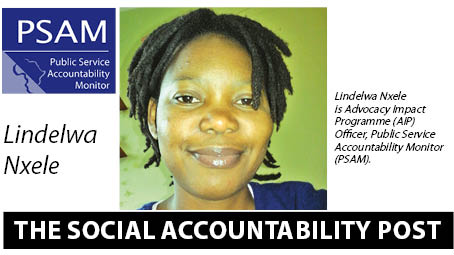By Lindelwa Nxele
With an estimated population of 82 060, Grahamstown is well known for being home to Rhodes University and the famous National Arts Festival. Regardless of the many successes the town enjoys with the Festival and education institutions, the municipality has been struggling with serious administrative challenges. Makana was placed under administration in 2015, following its inability to pay staff salaries and a huge debt. The nine-month intervention did not yield the expected outcome as Makana still suffers from debt, and poor service delivery. Water outages are consistent and almost every road in town has potholes due to lack of maintenance and mismanagement of the public resources. The local civil society organisations collective calling itself the Makana Unity League has started calling for administration again. However, there are some who are concerned that outside intervention is futile, as proven by the previous experience
Grahamstown residents have become accustomed to protests and marches, heading to the municipal offices to make their concerns known and demand answers for the poor state of the municipality. Studies show that it is to the best interests of society to ensure that duty-bearers manage public resources in an efficient, transparent, and socially accountable manner. In order to do this, the citizens need to understand how the various government processes work. Social accountability pertains to the citizens’ ability to hold government accountable for its actions, by demanding explanations and justifications for certain actions. The right to social accountability, therefore, promotes engagement and transparency regarding the management of public resources.
In order to efficiently exercise their right to social accountability, citizens need to be informed about the operations of the public resources management system and the various channels to follow when querying the use of public resources. It was this reason that drove the Unemployed People’s Movement (UPM) and the Public Service Accountability Monitor (PSAM) to want to understand the accessibility of the social accountability information in Grahamstown.
The PSAM is a university-based organisation involved in social accountability monitoring while the UPM is a community-based social movement that assists the public deal with various issues. They partnered to conduct research around accessibility of information to the Grahamstown community.
Due to limited resources and time-frames, only 30 people (15 men and 15 women) between 18 and 69 were interviewed. They were from Joza, Vukani, Hlalani, Ethembeni, and Fingo, Grahamstown West and Central. Respondents indicated that they had sufficient knowledge regarding the roles or the various public servants, although they needed information related the various government process that affect them as the public. They identified the social accountability related information as:
- All sorts of information that concerned them as community members and civil society.
- Basic rights and grants information.
- Municipalities expenditure records and the mismanagement of resources where applicable.
- The Integrated Development Plans (IDP), their budget allocation and how they are spent, as well as having access to the [municipal]five-year plans and progress reports.
- How the government advertises their posts and recruits officials
- Tenders and the criteria for accessing them.
- Who gets the services and the various steps an individual needs to take to access adequate services and employment?
- Water and sanitation issues, especially when they affect the community, like water shortages, etc. and be regularly informed about municipality affairs.
- Who to approach or where to report when your rights are being violated?
- Would like transparency concerning the management of resources.
- What resources are there that the municipality can provide for the people?
- How government officials ought to behave because I see that they are all corrupt starting from parliament to local and provincial, to me they are the same?
The respondents wanted the resource management process to be transparent enough to allow the community to monitor and assess the use of funds and ensure that proper regulations were followed when spending. There seemed to be a clear understanding that while, government resources were limited:
- The process of auditing [financial management within the municipality]and the nature of services being delivered.
- The basis under which the needs [of the citizens]are identified and the strategies that inform service delivery.
- What happens when the resources are not being managed adequately?
They explained that they did not want to depend on the government, but needed assistance them to start their own enterprises.
“Where we can go to get resources to start our own business and what help can we get from the government to have those businesses?” one respondent said.
Some informants stated that they have been kept in the dark by their officials regarding the state of affairs in their local regions, and that it was the responsibility of the public to ensure that the said officials become more engaging and transparent. They emphasised the fact that every citizen should benefit from the resources of the country, especially since the new democratic regime prides itself on being for the people.
With regard to the accessibility of social accountability, Figure 1 contains ratings related to how residents receive information while Figure 2 shows their preferred medium of communication.
In these illustrations, talking (word of mouth and meetings) were the most used ways of communicating with residents, with leaflets, internet and radio rated the lowest. Yet, most radio was rated the highest as the preferred tool for circulating and distributing social accountability information. Which is just as well, as the respondents also indicated a need for engagement platforms, which is a cored strength of radio stations like Radio Grahamstown.
- Lindelwa Nxele is Advocacy Impact Programme Officer and Researcher


